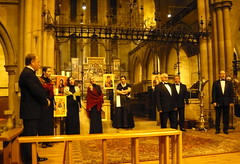 |
| Last read of the year |
Unless, by Carol Shields, was an odd book. It was beautifully written, and I enjoyed reading it immensely - but realise, at several months' distance, that I had to check the Amazon review to remind me of one of the threads. But I loved the involvement in the mind of writer heroine Reta, her anxieties about her eldest daughter who drops out of university and sits on a street corner in Toronto with a placard saying "Goodness", her tussles with her insensitive publisher, and I was completely convinced by her wonderful conversations with her friends.
After that, I had a quick scamper through some old Penguins. Sweet Danger and The Crime at Black Dudley, both by Margery Allingham, convinced me that I was right to consider The Tiger in the Smoke the best I've read of her books - the style remained seductive, but the plots were pretty daft. They were really old Penguins too - the original green and white covers, with yellowing pages, foxed at the edges.
One of my birthday books I had added to my wish list purely on the grounds of its Amazon description. The Stranger's Child, by Alan Hollinghurst, is a great tome (I read it in hardback - quite risky reading in bed when sleepy, lest it fall on one's nose) covering the span of almost a century with complete conviction and mastery. In one sense, it is a novel about a biography - a biography of someone we have already met in the opening chapters, just before the outbreak of World War 1. But it is also about Englishness, and about how people change over time, and about manners and customs and society ... and it is beautifully written and just challenging enough to keep me flipping back to check my memory against that of various protagonists.
Then I was lent A.D. Miller's Snow Drops as a suitably small paperback for a plane journey. This kept me riveted for two flights and the time in between, and I agreed with the reviewer who said it 'reads like Graham Greene on steroids'. Snowdrops are apparently the corpses that appear when the snow of the Russian winter melts, and the winter in Moscow is as much a character in this story of love and betrayal as Nick , the English lawyer, and Masha, the Russian girl he loves. The writer used to be The Economist's Moscow correspondent, and he convinces with every word. As I look forward to a trip to Russia in the coming year, I can't help wondering if 'grandma's summer' will be over and the cold air will already be threatening the winter to come...
I finished the year with another Josephine Tey, having so unexpectedly enjoyed The Franchise Affair. I had tried The Daughter of Time in my teens - I have a feeling my mother gave me it when I was off school with some bug - and completely failed to become interested in this tale of a convalescent detective solving the mystery of Richard the Third from his hospital bed. Who killed the Princes in the Tower? Perhaps they weren't killed at all. Was Richard the horror depicted by Shakespeare? Check the origin of his sources. The book is intricate, painstaking and fascinating. I shall never look at history in the same way again. The mature me loved it, and I finished it yesterday. The picture above is of the edition - now 50 years old - that I read; it seems to me a suitable illustration for an end-of-year blog post.
I have now started one of my Christmas books - two pages of The Girl who kicked the Hornet's Nest already have me feeling more cheerful about this wet Ne'erday - and there are others waiting in the wings. Now, off the computer and back to the books ...























